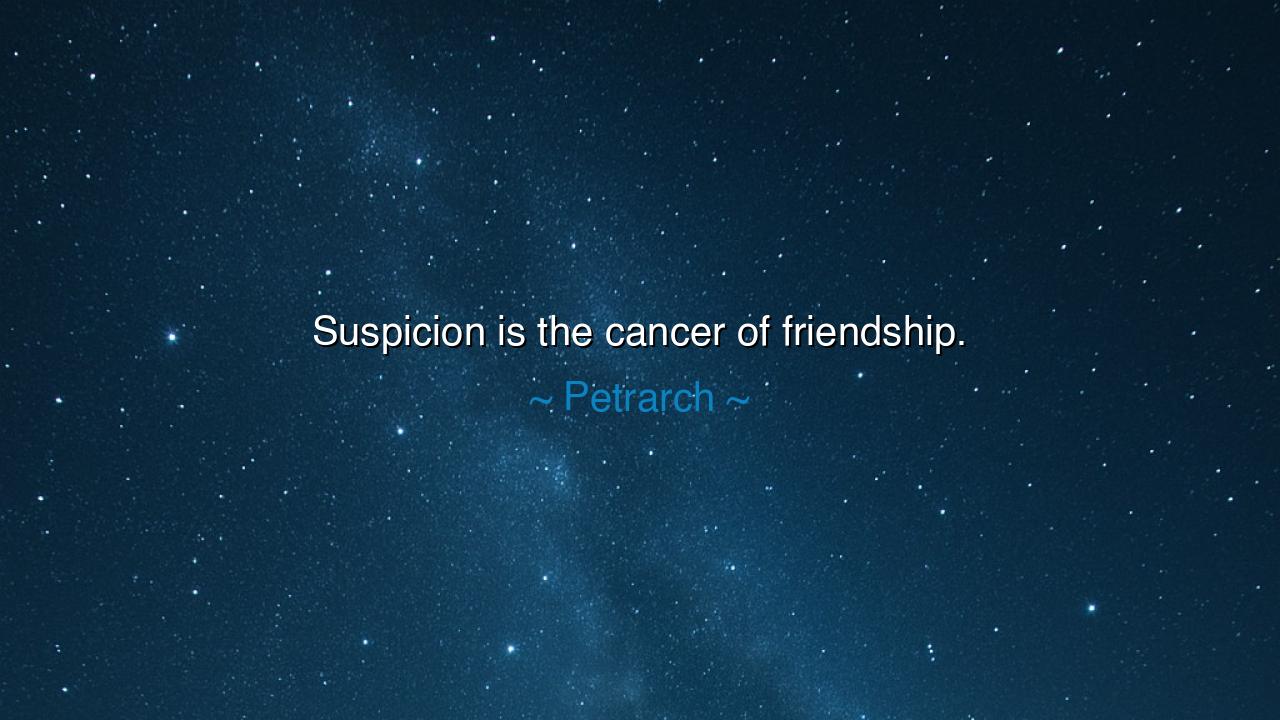
Suspicion is the cancer of friendship.






In the solemn and piercing words of Petrarch, the father of humanism and poet of the soul, we find a truth that has echoed through the corridors of time: “Suspicion is the cancer of friendship.” Few words are so simple, yet so devastating in meaning. Like the disease he invokes, suspicion begins as a whisper, a shadow upon the heart — small, unseen, and seemingly harmless. But left unchecked, it spreads, consuming the warmth of trust and the joy of companionship, until what once was living becomes hollow and cold. Petrarch speaks here not only as a philosopher, but as one who understood the delicate and sacred fabric of friendship, and how easily it can be torn apart by fear and doubt.
The origin of this thought rises from Petrarch’s own experience in the tumultuous world of 14th-century Italy — an age of shifting alliances, courtly intrigues, and betrayed confidences. As a scholar and statesman, he witnessed how envy and mistrust corroded bonds between noblemen, scholars, and even the Church itself. Yet his insight was not merely political. In his letters and poems, Petrarch wrote often of the human heart — its capacity for greatness, and its vulnerability to suspicion. To him, friendship was a divine bond, a mirror of the soul’s highest virtue. And suspicion, like a hidden rot, was the silent destroyer of that divine harmony.
For friendship is built upon trust, and trust is a fragile temple. When suspicion enters, it is as if a serpent has crept into Eden. It whispers lies that twist the mind: “Your friend does not care for you… They speak ill of you… They will betray you.” These thoughts, though often born from fear rather than truth, spread through the heart and poison the bond between souls. What began as love becomes calculation; what was once laughter turns into guarded silence. Thus Petrarch calls suspicion a cancer, for it devours from within. It does not strike swiftly, like the sword of anger, but slowly, cruelly — until only ashes remain where trust once burned bright.
Consider the story of Julius Caesar and Brutus, one of the most tragic examples of friendship destroyed by suspicion. Caesar, the great Roman, loved Brutus as a son; he trusted him more than any other. But in Brutus’ heart, a seed of doubt was planted by whispers and fear — the suspicion that Caesar sought to be king and enslave Rome. That suspicion grew until it became treachery. And when Caesar fell beneath the knives of his friends, his last words — “Et tu, Brute?” — were not of anger, but of heartbreak. Suspicion had done its work. It had turned love to fear, loyalty to ruin. Petrarch, a lover of ancient Rome, would have seen in this tale the perfect image of his warning: suspicion, once sown, brings only death to the heart’s most sacred bond.
There is also wisdom in the physician’s metaphor he chose. For cancer, like suspicion, begins invisibly. It feeds upon what is healthy. It thrives in secrecy. And the only cure is honesty — the light that exposes the shadow. When one feels suspicion arise, the wise act swiftly. They do not feed it with silence or pride. They speak. They ask. They trust until trust is clearly broken. To accuse without understanding, to judge without hearing, is to wound not only the friend, but one’s own soul. For in doubting another’s heart, we often reveal the weakness of our own.
Thus, Petrarch’s wisdom is both warning and counsel. He teaches that friendship is not sustained by perfection, but by faith. To be a friend is to risk betrayal, but to live without trust is to live without love. The ancients knew that to share bread and wine with another was to bind one’s spirit to theirs. Suspicion shatters that sacred bond. And so, the great philosopher urges us to be physicians of our own hearts — to cut away suspicion before it consumes what is holy within us.
So, my child, take this teaching into your life. When doubt arises between you and a friend, confront it not with fear but with courage. Speak truth. Ask openly. Believe in the goodness of those who have proven themselves, for only through trust can love endure. Guard your friendships not with suspicion, but with understanding. Tend them as you would a fire — with air, with patience, with care.
For in the end, suspicion is the cancer of friendship, but trust is its cure. The heart that chooses to trust, even when afraid, is the heart that keeps its light. And as Petrarch knew, in this fleeting world of shadows and change, there is no treasure more sacred, no fortress more enduring, than the friendship that has conquered doubt and stands unbroken in the clear and healing light of truth.






AAdministratorAdministrator
Welcome, honored guests. Please leave a comment, we will respond soon